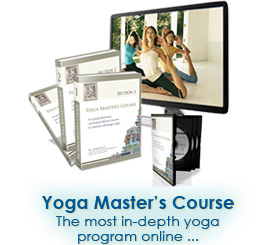[ Excerpt from The Science of Yoga, page 193 ]
The second level of awareness in yoga is emotional awareness.
No diet or physical training can bring health to the someone whose mind and emotions are unrestrained. I've known countless people who struggle to overcome ill health while 'doing all the right things' -- meaning that they religiously do the exercises that their therapist assigns, eat the proper foods and receive all the complementary healthcare treatments too.
Yet the improvement in their state of health is hardly noticeable. Some other, even more important factor must be at play.
Positive emotions have a beneficial effect on health and negative ones have a detrimental effect. Modern medicine is starting to understand that physical symptoms cannot be treated by physical means alone -- that the mind-body-emotional complex is inseparable when it comes to health.
This is what the term 'psychosomatics' is referring to -- emotions (psycho) affecting the body (soma). In yoga, we call this adhi-vyadhi. As Dr. Uma Krishnaswamy states:
"It is not always sensible to seek external solutions, in lieu of solutions lying within the inner world of the human being. The truth that the human body is a powerhouse of healing is only now being recognised within the perspective of modern science and means are being explored to tap these hidden resources. One can no longer rely solely on chemical or physical solutions to tackle the soma [body] while disregarding the psyche. There is a growing realisation within the bastion of orthodox medical research of the indivisibility of the three dimensions of the syncytium of life, physical-emotional-spiritual, set in the fourth dimension of time."
Emotions such as jealousy, greed, anger, distain, envy and malice are the most destructive emotions. Fear, guilt, aversion, frustration, impatience, and embarrassment too have detrimental effects on health. Conversely, feelings of joy, serenity, contentment, compassion, understanding, love and other unitive feelings support harmonious health.
In this stage we must cultivate an awareness of emotions as soon as they arise. If an emotion is of a higher, positive nature, then turn yourself over to that emotion and allow it to expand and grow. Conversely, if a negative emotion arises, become aware of it, resist it and control it before it is able to get out of control.
There is a wonderful concept in Hindu culture known as pratipaksha bhavanam, which literally means "opposite point of view." It is the conscious effort to immediately, by an act of will, replace any negative or devolutionary thought as soon as it arises, with an opposite, more virtuous and positive one. This practice is not only a great tool for cultivating awareness of our emotions, but also a transformative one on many levels.
Emotions then, play a crucial part in health, so much so that chronic and habitually negative emotional tendencies can depress health to a point where nothing can uplift it. Many are often caught unawares in this 'emotional holding pattern' so to speak, and not cognisant of the fact that they are always bitter, or always angry, or always negative, or self-pitying, etc, though others around them may be fully aware of this fact.
This state of mind exists simply because one has engaged so often and so frequently in those or other (usually negative) emotions, that they become the permanent theme of their attitudes and eventually settle in as their 'normal state of mind'.
It is particularly difficult to gain awareness of this because the ego does not want to see this 'ugly self', nor admit to what it would otherwise label as a flaw in the personality.
Those around us, those with whom we interact on a daily basis, provide a perfect mirror for us to perceive our self. We need only pay closer attention and really take note of the actions and reactions of others in our presence in order to become aware of our own negative emotional tendencies.
[Continued...]
---------------------
NOTE: This yoga article is an excerpt from The Science of Yoga, an online yoga training program with streaming yoga videos and 600 pages of step-by-step yoga instruction.

"The Science of Yoga is a course worthy of
leather binding and an honored place in the
finest libraries in the world
... It is indeed a masterful work."
Dr. John Michael Christian
AwakeningWithYoga.com
Learn More About
The Science of Yoga Course
|






